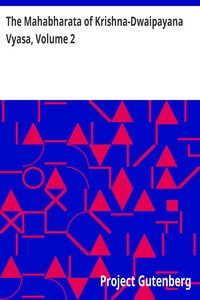The Mahabharata of Krishna-Dwaipayana Vyasa, Volume 2 by Kisari Mohan Ganguli
"The Mahabharata of Krishna-Dwaipayana Vyasa, Volume 2" by Kisari Mohan Ganguli is an ancient Indian epic written in the late 19th century. This monumental work is a historical narrative that weaves together elements of philosophy, ethics, and mythology surrounding the life and struggles of the Pandavas and Kauravas, two royal families at the heart of the story. In this volume, the focus shifts to the "Virata Parva," which recounts the events of
the Pandavas during their thirteenth year of exile, a year spent in disguise to avoid detection by their enemies. The opening of this volume sets the stage for the Pandavas' experiences in the kingdom of Virata as they attempt to navigate their new lives undercover. It begins with Janamejaya inquiring about the challenges faced by the Pandavas while hiding and highlights their planned disguises and roles: Yudhishthira as a Brahmana, Bhima as a cook, Arjuna as a transgender dance teacher, Nakula as a horse keeper, and Sahadeva as a cowherd. Their struggle to maintain their identities, fulfill their duties, and protect their wife, Draupadi, from the villain Kichaka, introduces themes of honor, loyalty, and the impact of their past adversities, setting the emotional tone for the trials they will face in this disguise-laden chapter of their lives. (This is an automatically generated summary.)
Read or download for free
| How to read | Url | Size | |||
|---|---|---|---|---|---|
| Read now! | https://www.gutenberg.org/ebooks/15475.html.images | 4.5 MB | |||
| EPUB3 (E-readers incl. Send-to-Kindle) | https://www.gutenberg.org/ebooks/15475.epub3.images | 1.5 MB | |||
| EPUB (older E-readers) | https://www.gutenberg.org/ebooks/15475.epub.images | 1.6 MB | |||
| EPUB (no images, older E-readers) | https://www.gutenberg.org/ebooks/15475.epub.noimages | 1.6 MB | |||
| Kindle | https://www.gutenberg.org/ebooks/15475.kf8.images | 3.0 MB | |||
| older Kindles | https://www.gutenberg.org/ebooks/15475.kindle.images | 2.6 MB | |||
| Plain Text UTF-8 | https://www.gutenberg.org/ebooks/15475.txt.utf-8 | 3.9 MB | |||
| Download HTML (zip) | https://www.gutenberg.org/cache/epub/15475/pg15475-h.zip | 1.4 MB | |||
| There may be more files related to this item. | |||||
Similar Books
About this eBook
| Translator | Ganguli, Kisari Mohan |
|---|---|
| Title |
The Mahabharata of Krishna-Dwaipayana Vyasa, Volume 2 Books 4, 5, 6 and 7 |
| Note | Reading ease score: 67.8 (8th & 9th grade). Neither easy nor difficult to read. |
| Credits | Produced by John B. Hare, David King, and David Widger |
| Language | English |
| LoC Class | PK: Language and Literatures: Indo-Iranian literatures |
| Subject | Epic literature, Sanskrit |
| Category | Text |
| EBook-No. | 15475 |
| Release Date | Mar 26, 2005 |
| Most Recently Updated | Jan 26, 2021 |
| Copyright Status | Public domain in the USA. |
| Downloads | 935 downloads in the last 30 days. |
| Project Gutenberg eBooks are always free! | |


